Organisational Behaviour: Impact of Culture, Power on Performance
VerifiedAdded on 2023/06/12
|14
|4630
|447
Report
AI Summary
This report examines organisational behaviour within a company context, focusing on how organisational culture, power dynamics, and politics influence individual and team behaviour and overall performance. It evaluates content and process theories of motivation, exploring various motivational techniques used by organisations to enhance employee engagement and productivity. The report also differentiates between effective and ineffective teams, highlighting the essential skills and experiences necessary for successful teamwork. Furthermore, it discusses organisational behaviour concepts and philosophies and their relationship with teamwork, providing a comprehensive analysis of factors impacting organisational effectiveness. The report uses Proctor & Gamble as a case study.
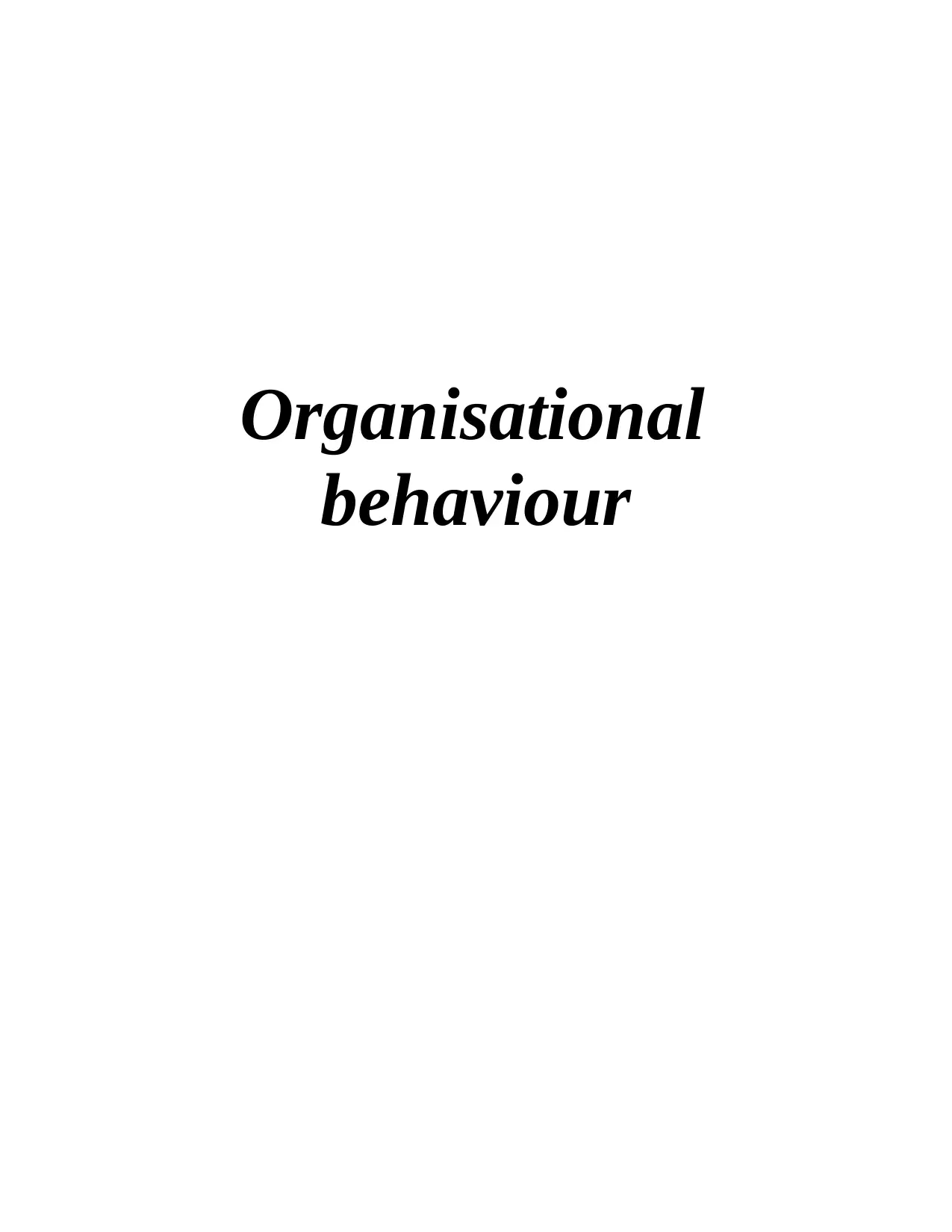
Organisational
behaviour
behaviour
Paraphrase This Document
Need a fresh take? Get an instant paraphrase of this document with our AI Paraphraser
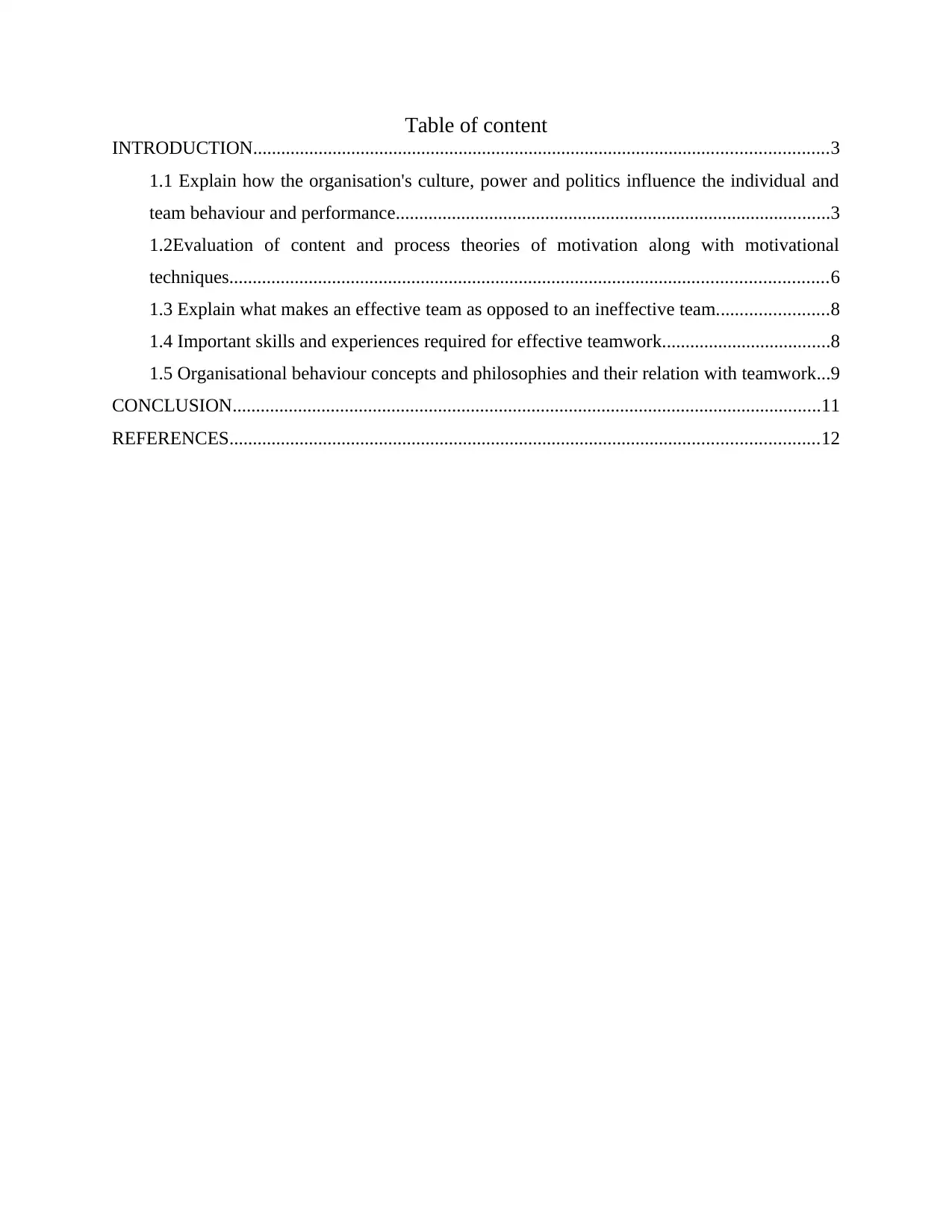
Table of content
INTRODUCTION...........................................................................................................................3
1.1 Explain how the organisation's culture, power and politics influence the individual and
team behaviour and performance.............................................................................................3
1.2Evaluation of content and process theories of motivation along with motivational
techniques................................................................................................................................6
1.3 Explain what makes an effective team as opposed to an ineffective team........................8
1.4 Important skills and experiences required for effective teamwork....................................8
1.5 Organisational behaviour concepts and philosophies and their relation with teamwork...9
CONCLUSION..............................................................................................................................11
REFERENCES..............................................................................................................................12
INTRODUCTION...........................................................................................................................3
1.1 Explain how the organisation's culture, power and politics influence the individual and
team behaviour and performance.............................................................................................3
1.2Evaluation of content and process theories of motivation along with motivational
techniques................................................................................................................................6
1.3 Explain what makes an effective team as opposed to an ineffective team........................8
1.4 Important skills and experiences required for effective teamwork....................................8
1.5 Organisational behaviour concepts and philosophies and their relation with teamwork...9
CONCLUSION..............................................................................................................................11
REFERENCES..............................................................................................................................12
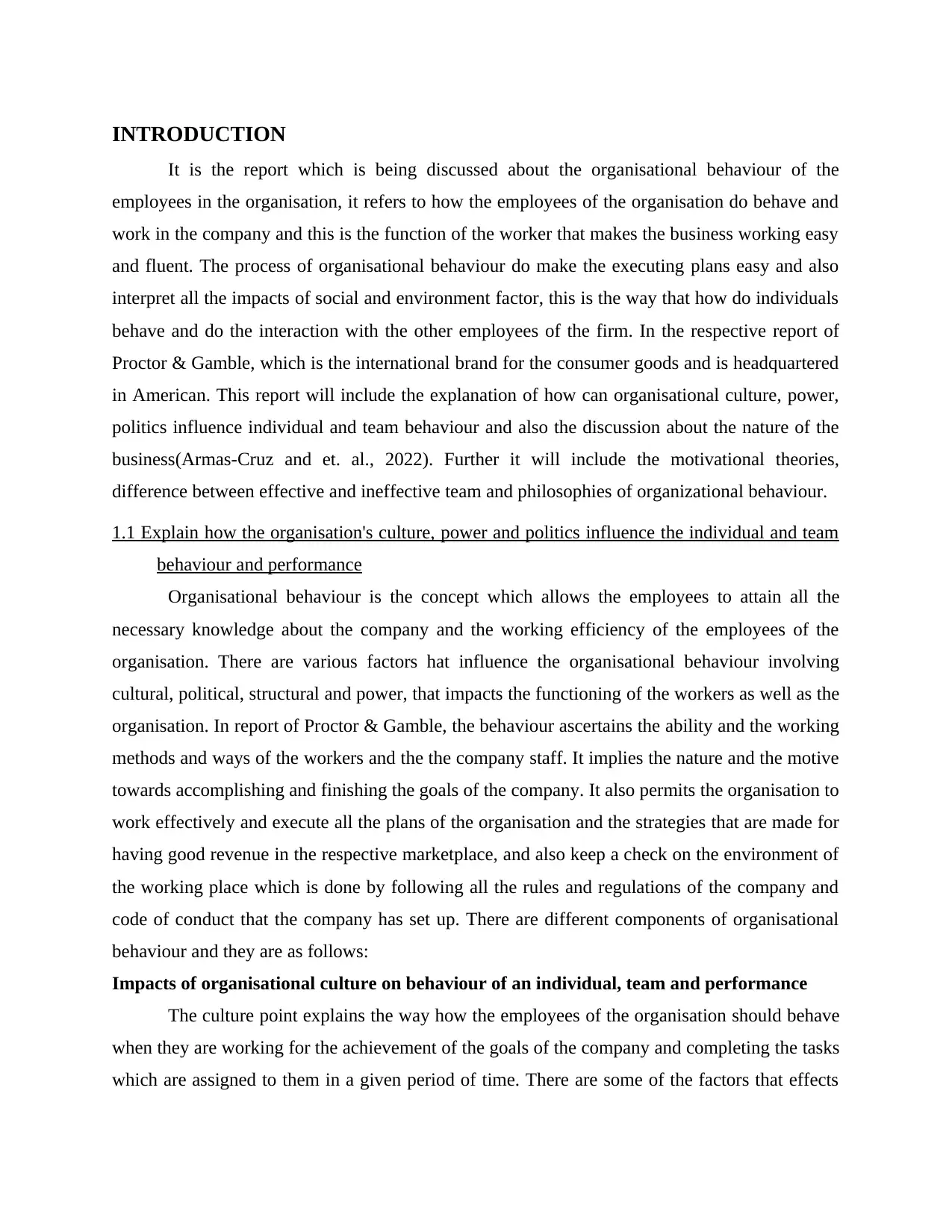
INTRODUCTION
It is the report which is being discussed about the organisational behaviour of the
employees in the organisation, it refers to how the employees of the organisation do behave and
work in the company and this is the function of the worker that makes the business working easy
and fluent. The process of organisational behaviour do make the executing plans easy and also
interpret all the impacts of social and environment factor, this is the way that how do individuals
behave and do the interaction with the other employees of the firm. In the respective report of
Proctor & Gamble, which is the international brand for the consumer goods and is headquartered
in American. This report will include the explanation of how can organisational culture, power,
politics influence individual and team behaviour and also the discussion about the nature of the
business(Armas-Cruz and et. al., 2022). Further it will include the motivational theories,
difference between effective and ineffective team and philosophies of organizational behaviour.
1.1 Explain how the organisation's culture, power and politics influence the individual and team
behaviour and performance
Organisational behaviour is the concept which allows the employees to attain all the
necessary knowledge about the company and the working efficiency of the employees of the
organisation. There are various factors hat influence the organisational behaviour involving
cultural, political, structural and power, that impacts the functioning of the workers as well as the
organisation. In report of Proctor & Gamble, the behaviour ascertains the ability and the working
methods and ways of the workers and the the company staff. It implies the nature and the motive
towards accomplishing and finishing the goals of the company. It also permits the organisation to
work effectively and execute all the plans of the organisation and the strategies that are made for
having good revenue in the respective marketplace, and also keep a check on the environment of
the working place which is done by following all the rules and regulations of the company and
code of conduct that the company has set up. There are different components of organisational
behaviour and they are as follows:
Impacts of organisational culture on behaviour of an individual, team and performance
The culture point explains the way how the employees of the organisation should behave
when they are working for the achievement of the goals of the company and completing the tasks
which are assigned to them in a given period of time. There are some of the factors that effects
It is the report which is being discussed about the organisational behaviour of the
employees in the organisation, it refers to how the employees of the organisation do behave and
work in the company and this is the function of the worker that makes the business working easy
and fluent. The process of organisational behaviour do make the executing plans easy and also
interpret all the impacts of social and environment factor, this is the way that how do individuals
behave and do the interaction with the other employees of the firm. In the respective report of
Proctor & Gamble, which is the international brand for the consumer goods and is headquartered
in American. This report will include the explanation of how can organisational culture, power,
politics influence individual and team behaviour and also the discussion about the nature of the
business(Armas-Cruz and et. al., 2022). Further it will include the motivational theories,
difference between effective and ineffective team and philosophies of organizational behaviour.
1.1 Explain how the organisation's culture, power and politics influence the individual and team
behaviour and performance
Organisational behaviour is the concept which allows the employees to attain all the
necessary knowledge about the company and the working efficiency of the employees of the
organisation. There are various factors hat influence the organisational behaviour involving
cultural, political, structural and power, that impacts the functioning of the workers as well as the
organisation. In report of Proctor & Gamble, the behaviour ascertains the ability and the working
methods and ways of the workers and the the company staff. It implies the nature and the motive
towards accomplishing and finishing the goals of the company. It also permits the organisation to
work effectively and execute all the plans of the organisation and the strategies that are made for
having good revenue in the respective marketplace, and also keep a check on the environment of
the working place which is done by following all the rules and regulations of the company and
code of conduct that the company has set up. There are different components of organisational
behaviour and they are as follows:
Impacts of organisational culture on behaviour of an individual, team and performance
The culture point explains the way how the employees of the organisation should behave
when they are working for the achievement of the goals of the company and completing the tasks
which are assigned to them in a given period of time. There are some of the factors that effects
⊘ This is a preview!⊘
Do you want full access?
Subscribe today to unlock all pages.

Trusted by 1+ million students worldwide
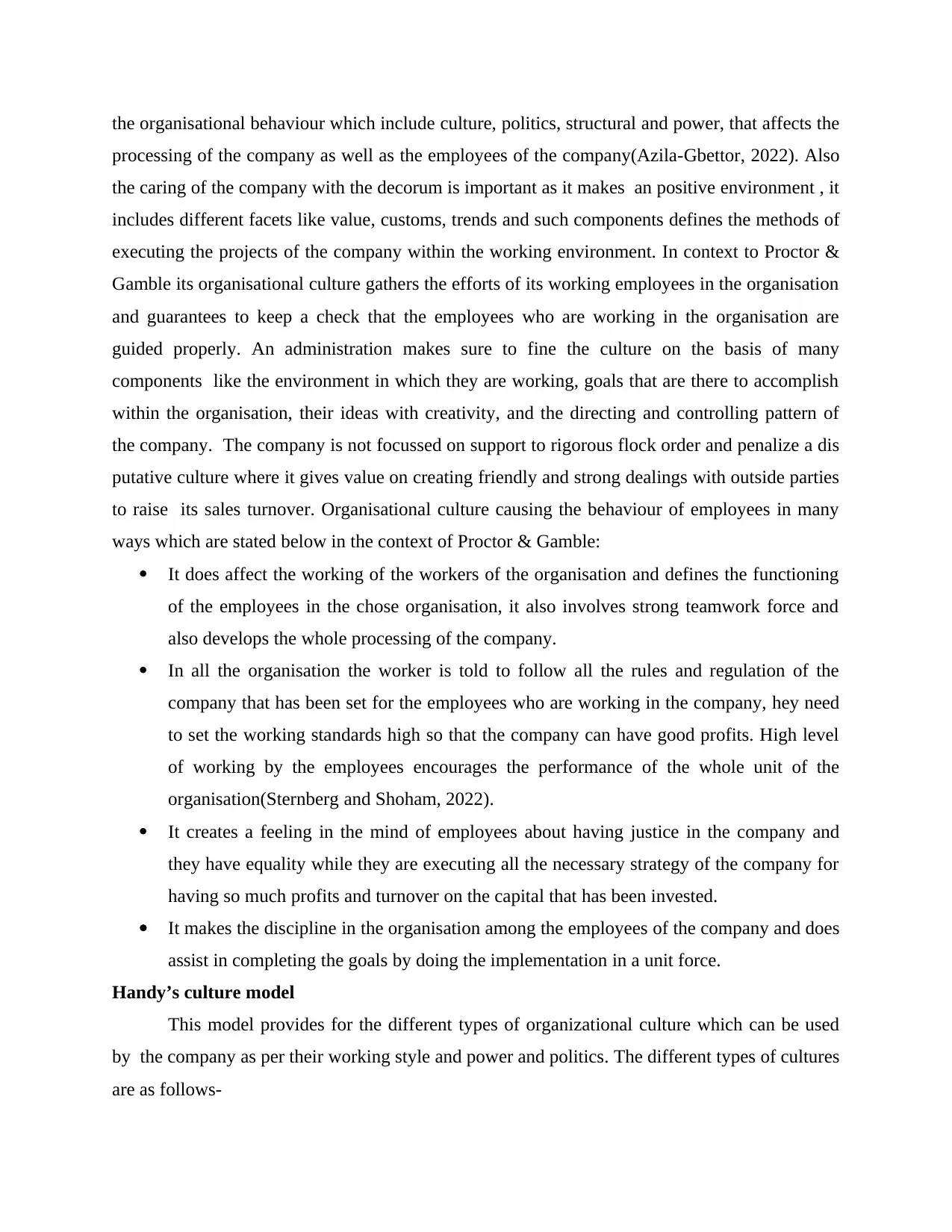
the organisational behaviour which include culture, politics, structural and power, that affects the
processing of the company as well as the employees of the company(Azila-Gbettor, 2022). Also
the caring of the company with the decorum is important as it makes an positive environment , it
includes different facets like value, customs, trends and such components defines the methods of
executing the projects of the company within the working environment. In context to Proctor &
Gamble its organisational culture gathers the efforts of its working employees in the organisation
and guarantees to keep a check that the employees who are working in the organisation are
guided properly. An administration makes sure to fine the culture on the basis of many
components like the environment in which they are working, goals that are there to accomplish
within the organisation, their ideas with creativity, and the directing and controlling pattern of
the company. The company is not focussed on support to rigorous flock order and penalize a dis
putative culture where it gives value on creating friendly and strong dealings with outside parties
to raise its sales turnover. Organisational culture causing the behaviour of employees in many
ways which are stated below in the context of Proctor & Gamble:
It does affect the working of the workers of the organisation and defines the functioning
of the employees in the chose organisation, it also involves strong teamwork force and
also develops the whole processing of the company.
In all the organisation the worker is told to follow all the rules and regulation of the
company that has been set for the employees who are working in the company, hey need
to set the working standards high so that the company can have good profits. High level
of working by the employees encourages the performance of the whole unit of the
organisation(Sternberg and Shoham, 2022).
It creates a feeling in the mind of employees about having justice in the company and
they have equality while they are executing all the necessary strategy of the company for
having so much profits and turnover on the capital that has been invested.
It makes the discipline in the organisation among the employees of the company and does
assist in completing the goals by doing the implementation in a unit force.
Handy’s culture model
This model provides for the different types of organizational culture which can be used
by the company as per their working style and power and politics. The different types of cultures
are as follows-
processing of the company as well as the employees of the company(Azila-Gbettor, 2022). Also
the caring of the company with the decorum is important as it makes an positive environment , it
includes different facets like value, customs, trends and such components defines the methods of
executing the projects of the company within the working environment. In context to Proctor &
Gamble its organisational culture gathers the efforts of its working employees in the organisation
and guarantees to keep a check that the employees who are working in the organisation are
guided properly. An administration makes sure to fine the culture on the basis of many
components like the environment in which they are working, goals that are there to accomplish
within the organisation, their ideas with creativity, and the directing and controlling pattern of
the company. The company is not focussed on support to rigorous flock order and penalize a dis
putative culture where it gives value on creating friendly and strong dealings with outside parties
to raise its sales turnover. Organisational culture causing the behaviour of employees in many
ways which are stated below in the context of Proctor & Gamble:
It does affect the working of the workers of the organisation and defines the functioning
of the employees in the chose organisation, it also involves strong teamwork force and
also develops the whole processing of the company.
In all the organisation the worker is told to follow all the rules and regulation of the
company that has been set for the employees who are working in the company, hey need
to set the working standards high so that the company can have good profits. High level
of working by the employees encourages the performance of the whole unit of the
organisation(Sternberg and Shoham, 2022).
It creates a feeling in the mind of employees about having justice in the company and
they have equality while they are executing all the necessary strategy of the company for
having so much profits and turnover on the capital that has been invested.
It makes the discipline in the organisation among the employees of the company and does
assist in completing the goals by doing the implementation in a unit force.
Handy’s culture model
This model provides for the different types of organizational culture which can be used
by the company as per their working style and power and politics. The different types of cultures
are as follows-
Paraphrase This Document
Need a fresh take? Get an instant paraphrase of this document with our AI Paraphraser
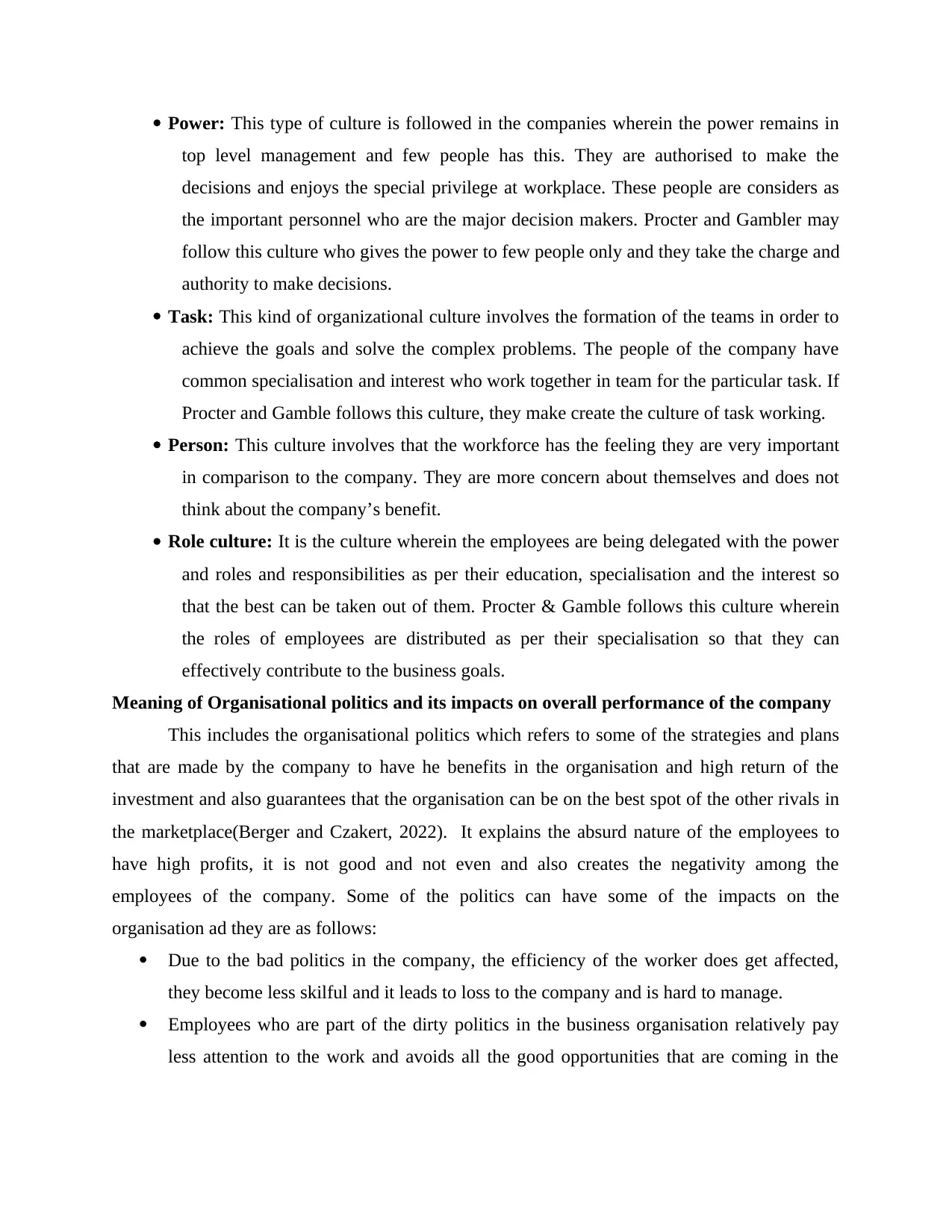
Power: This type of culture is followed in the companies wherein the power remains in
top level management and few people has this. They are authorised to make the
decisions and enjoys the special privilege at workplace. These people are considers as
the important personnel who are the major decision makers. Procter and Gambler may
follow this culture who gives the power to few people only and they take the charge and
authority to make decisions.
Task: This kind of organizational culture involves the formation of the teams in order to
achieve the goals and solve the complex problems. The people of the company have
common specialisation and interest who work together in team for the particular task. If
Procter and Gamble follows this culture, they make create the culture of task working.
Person: This culture involves that the workforce has the feeling they are very important
in comparison to the company. They are more concern about themselves and does not
think about the company’s benefit.
Role culture: It is the culture wherein the employees are being delegated with the power
and roles and responsibilities as per their education, specialisation and the interest so
that the best can be taken out of them. Procter & Gamble follows this culture wherein
the roles of employees are distributed as per their specialisation so that they can
effectively contribute to the business goals.
Meaning of Organisational politics and its impacts on overall performance of the company
This includes the organisational politics which refers to some of the strategies and plans
that are made by the company to have he benefits in the organisation and high return of the
investment and also guarantees that the organisation can be on the best spot of the other rivals in
the marketplace(Berger and Czakert, 2022). It explains the absurd nature of the employees to
have high profits, it is not good and not even and also creates the negativity among the
employees of the company. Some of the politics can have some of the impacts on the
organisation ad they are as follows:
Due to the bad politics in the company, the efficiency of the worker does get affected,
they become less skilful and it leads to loss to the company and is hard to manage.
Employees who are part of the dirty politics in the business organisation relatively pay
less attention to the work and avoids all the good opportunities that are coming in the
top level management and few people has this. They are authorised to make the
decisions and enjoys the special privilege at workplace. These people are considers as
the important personnel who are the major decision makers. Procter and Gambler may
follow this culture who gives the power to few people only and they take the charge and
authority to make decisions.
Task: This kind of organizational culture involves the formation of the teams in order to
achieve the goals and solve the complex problems. The people of the company have
common specialisation and interest who work together in team for the particular task. If
Procter and Gamble follows this culture, they make create the culture of task working.
Person: This culture involves that the workforce has the feeling they are very important
in comparison to the company. They are more concern about themselves and does not
think about the company’s benefit.
Role culture: It is the culture wherein the employees are being delegated with the power
and roles and responsibilities as per their education, specialisation and the interest so
that the best can be taken out of them. Procter & Gamble follows this culture wherein
the roles of employees are distributed as per their specialisation so that they can
effectively contribute to the business goals.
Meaning of Organisational politics and its impacts on overall performance of the company
This includes the organisational politics which refers to some of the strategies and plans
that are made by the company to have he benefits in the organisation and high return of the
investment and also guarantees that the organisation can be on the best spot of the other rivals in
the marketplace(Berger and Czakert, 2022). It explains the absurd nature of the employees to
have high profits, it is not good and not even and also creates the negativity among the
employees of the company. Some of the politics can have some of the impacts on the
organisation ad they are as follows:
Due to the bad politics in the company, the efficiency of the worker does get affected,
they become less skilful and it leads to loss to the company and is hard to manage.
Employees who are part of the dirty politics in the business organisation relatively pay
less attention to the work and avoids all the good opportunities that are coming in the
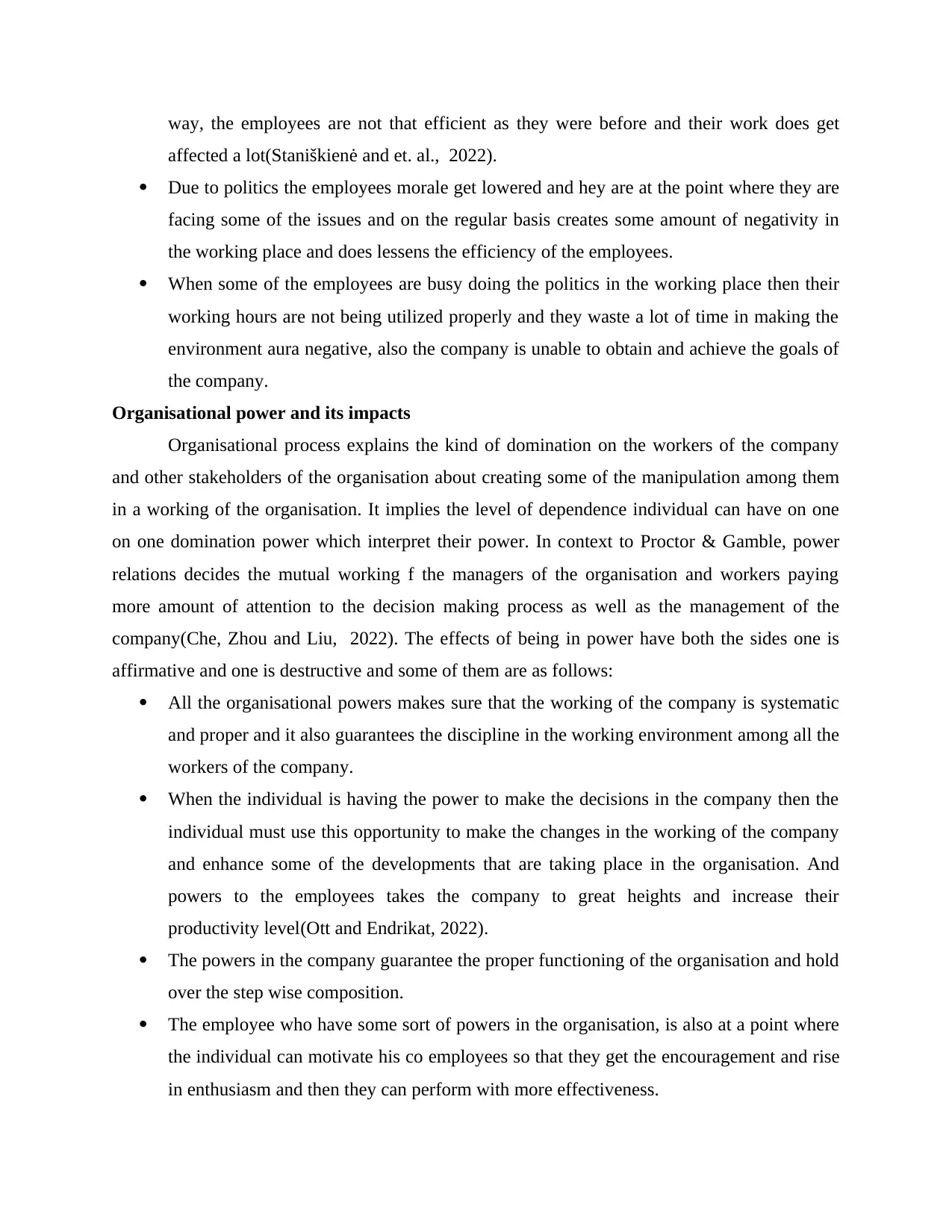
way, the employees are not that efficient as they were before and their work does get
affected a lot(Staniškienė and et. al., 2022).
Due to politics the employees morale get lowered and hey are at the point where they are
facing some of the issues and on the regular basis creates some amount of negativity in
the working place and does lessens the efficiency of the employees.
When some of the employees are busy doing the politics in the working place then their
working hours are not being utilized properly and they waste a lot of time in making the
environment aura negative, also the company is unable to obtain and achieve the goals of
the company.
Organisational power and its impacts
Organisational process explains the kind of domination on the workers of the company
and other stakeholders of the organisation about creating some of the manipulation among them
in a working of the organisation. It implies the level of dependence individual can have on one
on one domination power which interpret their power. In context to Proctor & Gamble, power
relations decides the mutual working f the managers of the organisation and workers paying
more amount of attention to the decision making process as well as the management of the
company(Che, Zhou and Liu, 2022). The effects of being in power have both the sides one is
affirmative and one is destructive and some of them are as follows:
All the organisational powers makes sure that the working of the company is systematic
and proper and it also guarantees the discipline in the working environment among all the
workers of the company.
When the individual is having the power to make the decisions in the company then the
individual must use this opportunity to make the changes in the working of the company
and enhance some of the developments that are taking place in the organisation. And
powers to the employees takes the company to great heights and increase their
productivity level(Ott and Endrikat, 2022).
The powers in the company guarantee the proper functioning of the organisation and hold
over the step wise composition.
The employee who have some sort of powers in the organisation, is also at a point where
the individual can motivate his co employees so that they get the encouragement and rise
in enthusiasm and then they can perform with more effectiveness.
affected a lot(Staniškienė and et. al., 2022).
Due to politics the employees morale get lowered and hey are at the point where they are
facing some of the issues and on the regular basis creates some amount of negativity in
the working place and does lessens the efficiency of the employees.
When some of the employees are busy doing the politics in the working place then their
working hours are not being utilized properly and they waste a lot of time in making the
environment aura negative, also the company is unable to obtain and achieve the goals of
the company.
Organisational power and its impacts
Organisational process explains the kind of domination on the workers of the company
and other stakeholders of the organisation about creating some of the manipulation among them
in a working of the organisation. It implies the level of dependence individual can have on one
on one domination power which interpret their power. In context to Proctor & Gamble, power
relations decides the mutual working f the managers of the organisation and workers paying
more amount of attention to the decision making process as well as the management of the
company(Che, Zhou and Liu, 2022). The effects of being in power have both the sides one is
affirmative and one is destructive and some of them are as follows:
All the organisational powers makes sure that the working of the company is systematic
and proper and it also guarantees the discipline in the working environment among all the
workers of the company.
When the individual is having the power to make the decisions in the company then the
individual must use this opportunity to make the changes in the working of the company
and enhance some of the developments that are taking place in the organisation. And
powers to the employees takes the company to great heights and increase their
productivity level(Ott and Endrikat, 2022).
The powers in the company guarantee the proper functioning of the organisation and hold
over the step wise composition.
The employee who have some sort of powers in the organisation, is also at a point where
the individual can motivate his co employees so that they get the encouragement and rise
in enthusiasm and then they can perform with more effectiveness.
⊘ This is a preview!⊘
Do you want full access?
Subscribe today to unlock all pages.

Trusted by 1+ million students worldwide
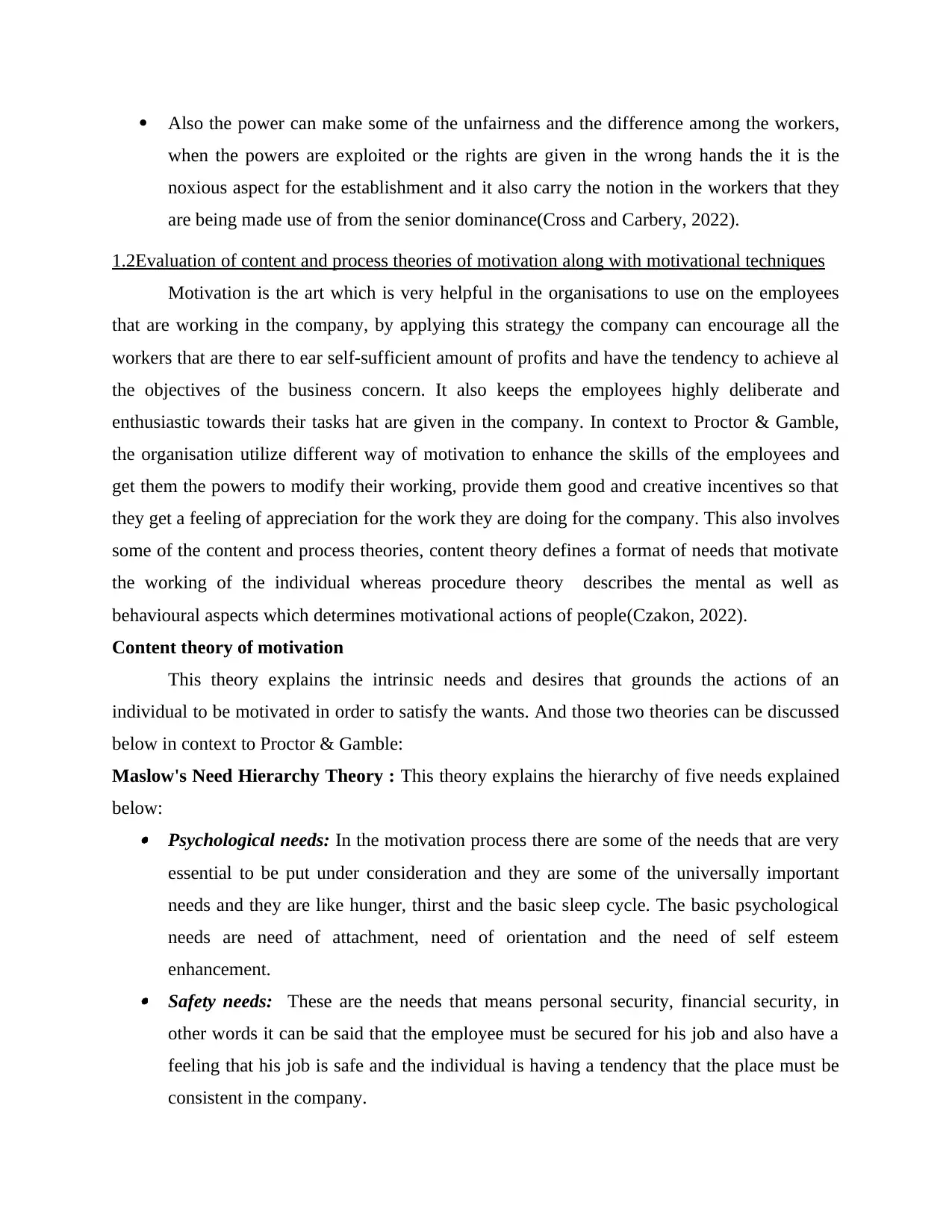
Also the power can make some of the unfairness and the difference among the workers,
when the powers are exploited or the rights are given in the wrong hands the it is the
noxious aspect for the establishment and it also carry the notion in the workers that they
are being made use of from the senior dominance(Cross and Carbery, 2022).
1.2Evaluation of content and process theories of motivation along with motivational techniques
Motivation is the art which is very helpful in the organisations to use on the employees
that are working in the company, by applying this strategy the company can encourage all the
workers that are there to ear self-sufficient amount of profits and have the tendency to achieve al
the objectives of the business concern. It also keeps the employees highly deliberate and
enthusiastic towards their tasks hat are given in the company. In context to Proctor & Gamble,
the organisation utilize different way of motivation to enhance the skills of the employees and
get them the powers to modify their working, provide them good and creative incentives so that
they get a feeling of appreciation for the work they are doing for the company. This also involves
some of the content and process theories, content theory defines a format of needs that motivate
the working of the individual whereas procedure theory describes the mental as well as
behavioural aspects which determines motivational actions of people(Czakon, 2022).
Content theory of motivation
This theory explains the intrinsic needs and desires that grounds the actions of an
individual to be motivated in order to satisfy the wants. And those two theories can be discussed
below in context to Proctor & Gamble:
Maslow's Need Hierarchy Theory : This theory explains the hierarchy of five needs explained
below: Psychological needs: In the motivation process there are some of the needs that are very
essential to be put under consideration and they are some of the universally important
needs and they are like hunger, thirst and the basic sleep cycle. The basic psychological
needs are need of attachment, need of orientation and the need of self esteem
enhancement. Safety needs: These are the needs that means personal security, financial security, in
other words it can be said that the employee must be secured for his job and also have a
feeling that his job is safe and the individual is having a tendency that the place must be
consistent in the company.
when the powers are exploited or the rights are given in the wrong hands the it is the
noxious aspect for the establishment and it also carry the notion in the workers that they
are being made use of from the senior dominance(Cross and Carbery, 2022).
1.2Evaluation of content and process theories of motivation along with motivational techniques
Motivation is the art which is very helpful in the organisations to use on the employees
that are working in the company, by applying this strategy the company can encourage all the
workers that are there to ear self-sufficient amount of profits and have the tendency to achieve al
the objectives of the business concern. It also keeps the employees highly deliberate and
enthusiastic towards their tasks hat are given in the company. In context to Proctor & Gamble,
the organisation utilize different way of motivation to enhance the skills of the employees and
get them the powers to modify their working, provide them good and creative incentives so that
they get a feeling of appreciation for the work they are doing for the company. This also involves
some of the content and process theories, content theory defines a format of needs that motivate
the working of the individual whereas procedure theory describes the mental as well as
behavioural aspects which determines motivational actions of people(Czakon, 2022).
Content theory of motivation
This theory explains the intrinsic needs and desires that grounds the actions of an
individual to be motivated in order to satisfy the wants. And those two theories can be discussed
below in context to Proctor & Gamble:
Maslow's Need Hierarchy Theory : This theory explains the hierarchy of five needs explained
below: Psychological needs: In the motivation process there are some of the needs that are very
essential to be put under consideration and they are some of the universally important
needs and they are like hunger, thirst and the basic sleep cycle. The basic psychological
needs are need of attachment, need of orientation and the need of self esteem
enhancement. Safety needs: These are the needs that means personal security, financial security, in
other words it can be said that the employee must be secured for his job and also have a
feeling that his job is safe and the individual is having a tendency that the place must be
consistent in the company.
Paraphrase This Document
Need a fresh take? Get an instant paraphrase of this document with our AI Paraphraser
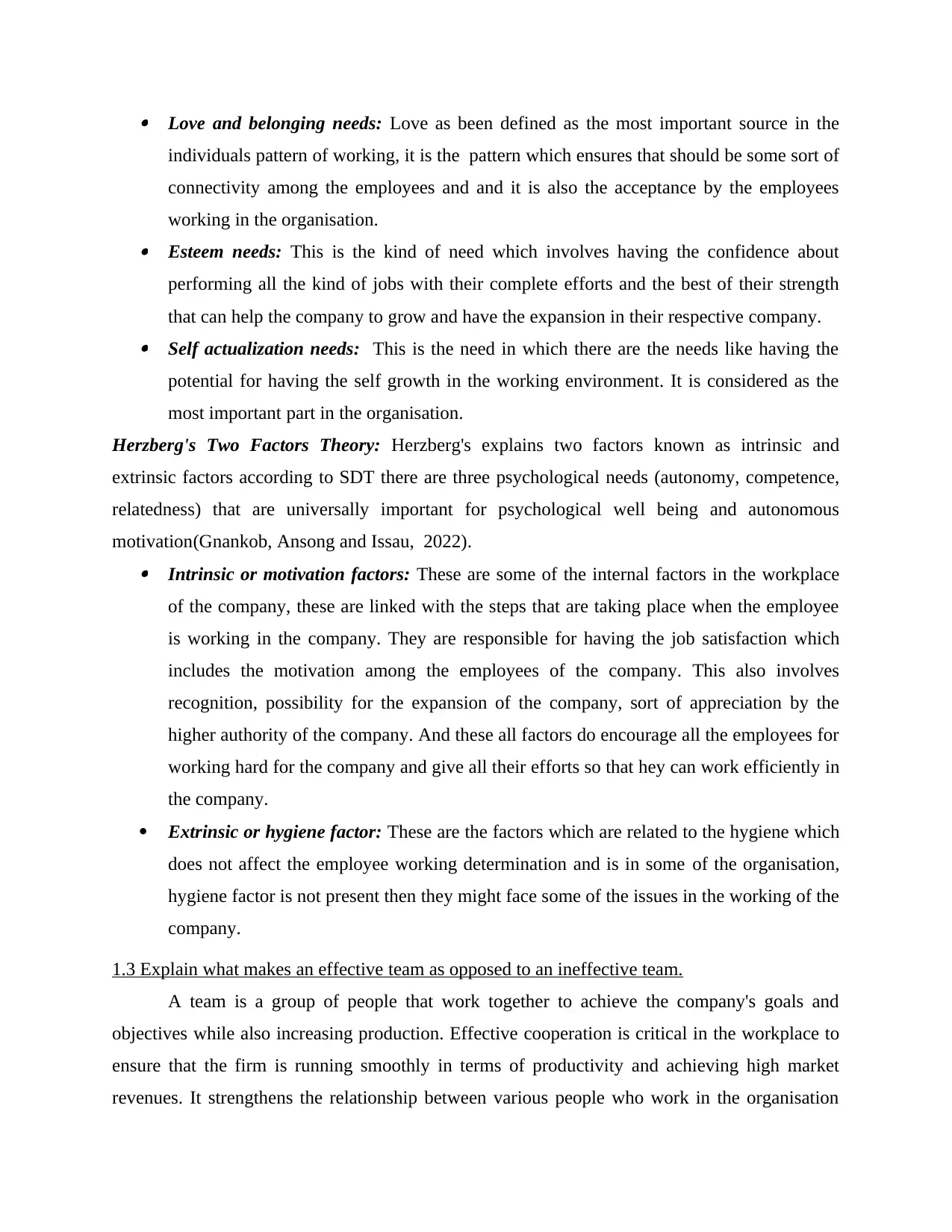
Love and belonging needs: Love as been defined as the most important source in the
individuals pattern of working, it is the pattern which ensures that should be some sort of
connectivity among the employees and and it is also the acceptance by the employees
working in the organisation. Esteem needs: This is the kind of need which involves having the confidence about
performing all the kind of jobs with their complete efforts and the best of their strength
that can help the company to grow and have the expansion in their respective company. Self actualization needs: This is the need in which there are the needs like having the
potential for having the self growth in the working environment. It is considered as the
most important part in the organisation.
Herzberg's Two Factors Theory: Herzberg's explains two factors known as intrinsic and
extrinsic factors according to SDT there are three psychological needs (autonomy, competence,
relatedness) that are universally important for psychological well being and autonomous
motivation(Gnankob, Ansong and Issau, 2022). Intrinsic or motivation factors: These are some of the internal factors in the workplace
of the company, these are linked with the steps that are taking place when the employee
is working in the company. They are responsible for having the job satisfaction which
includes the motivation among the employees of the company. This also involves
recognition, possibility for the expansion of the company, sort of appreciation by the
higher authority of the company. And these all factors do encourage all the employees for
working hard for the company and give all their efforts so that hey can work efficiently in
the company.
Extrinsic or hygiene factor: These are the factors which are related to the hygiene which
does not affect the employee working determination and is in some of the organisation,
hygiene factor is not present then they might face some of the issues in the working of the
company.
1.3 Explain what makes an effective team as opposed to an ineffective team.
A team is a group of people that work together to achieve the company's goals and
objectives while also increasing production. Effective cooperation is critical in the workplace to
ensure that the firm is running smoothly in terms of productivity and achieving high market
revenues. It strengthens the relationship between various people who work in the organisation
individuals pattern of working, it is the pattern which ensures that should be some sort of
connectivity among the employees and and it is also the acceptance by the employees
working in the organisation. Esteem needs: This is the kind of need which involves having the confidence about
performing all the kind of jobs with their complete efforts and the best of their strength
that can help the company to grow and have the expansion in their respective company. Self actualization needs: This is the need in which there are the needs like having the
potential for having the self growth in the working environment. It is considered as the
most important part in the organisation.
Herzberg's Two Factors Theory: Herzberg's explains two factors known as intrinsic and
extrinsic factors according to SDT there are three psychological needs (autonomy, competence,
relatedness) that are universally important for psychological well being and autonomous
motivation(Gnankob, Ansong and Issau, 2022). Intrinsic or motivation factors: These are some of the internal factors in the workplace
of the company, these are linked with the steps that are taking place when the employee
is working in the company. They are responsible for having the job satisfaction which
includes the motivation among the employees of the company. This also involves
recognition, possibility for the expansion of the company, sort of appreciation by the
higher authority of the company. And these all factors do encourage all the employees for
working hard for the company and give all their efforts so that hey can work efficiently in
the company.
Extrinsic or hygiene factor: These are the factors which are related to the hygiene which
does not affect the employee working determination and is in some of the organisation,
hygiene factor is not present then they might face some of the issues in the working of the
company.
1.3 Explain what makes an effective team as opposed to an ineffective team.
A team is a group of people that work together to achieve the company's goals and
objectives while also increasing production. Effective cooperation is critical in the workplace to
ensure that the firm is running smoothly in terms of productivity and achieving high market
revenues. It strengthens the relationship between various people who work in the organisation
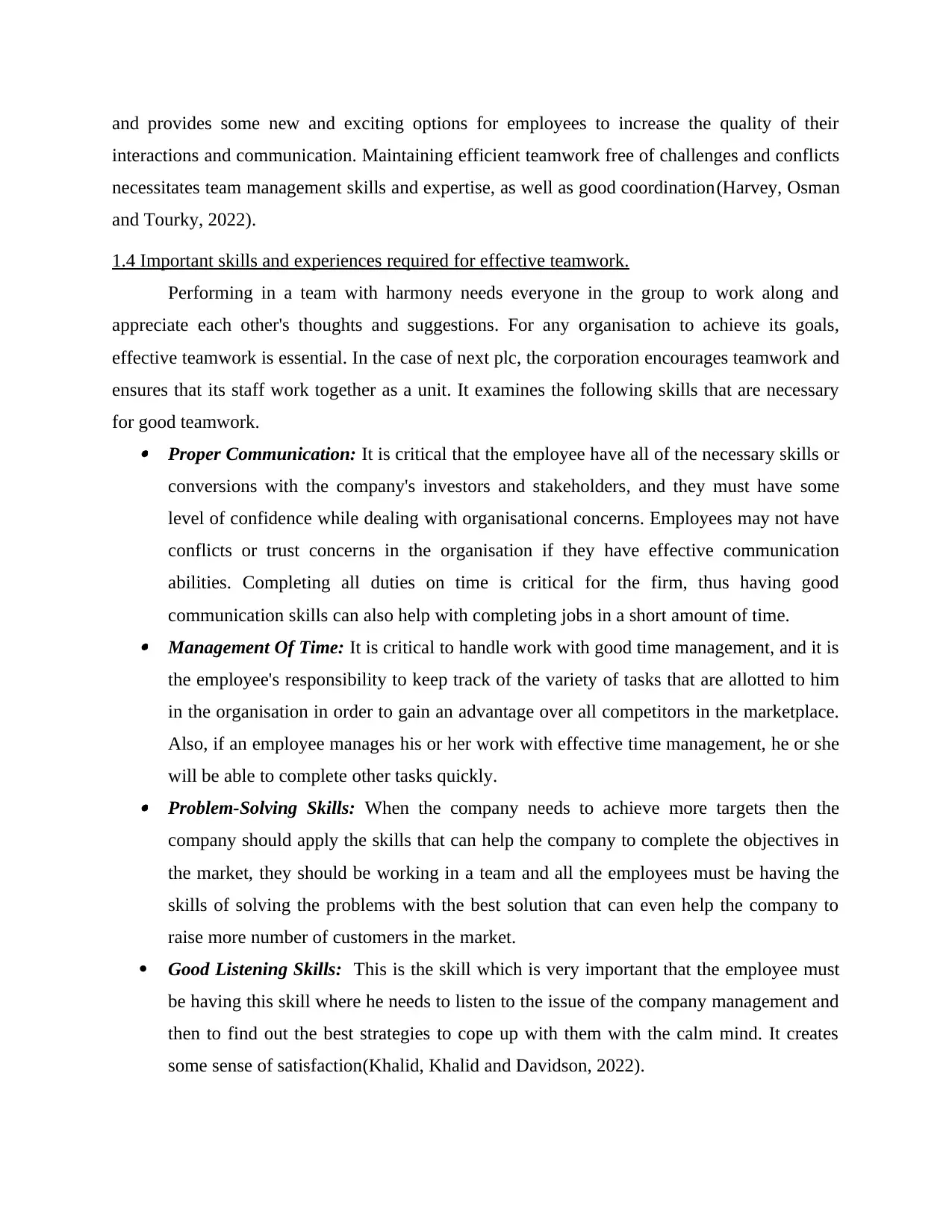
and provides some new and exciting options for employees to increase the quality of their
interactions and communication. Maintaining efficient teamwork free of challenges and conflicts
necessitates team management skills and expertise, as well as good coordination(Harvey, Osman
and Tourky, 2022).
1.4 Important skills and experiences required for effective teamwork.
Performing in a team with harmony needs everyone in the group to work along and
appreciate each other's thoughts and suggestions. For any organisation to achieve its goals,
effective teamwork is essential. In the case of next plc, the corporation encourages teamwork and
ensures that its staff work together as a unit. It examines the following skills that are necessary
for good teamwork. Proper Communication: It is critical that the employee have all of the necessary skills or
conversions with the company's investors and stakeholders, and they must have some
level of confidence while dealing with organisational concerns. Employees may not have
conflicts or trust concerns in the organisation if they have effective communication
abilities. Completing all duties on time is critical for the firm, thus having good
communication skills can also help with completing jobs in a short amount of time. Management Of Time: It is critical to handle work with good time management, and it is
the employee's responsibility to keep track of the variety of tasks that are allotted to him
in the organisation in order to gain an advantage over all competitors in the marketplace.
Also, if an employee manages his or her work with effective time management, he or she
will be able to complete other tasks quickly. Problem-Solving Skills: When the company needs to achieve more targets then the
company should apply the skills that can help the company to complete the objectives in
the market, they should be working in a team and all the employees must be having the
skills of solving the problems with the best solution that can even help the company to
raise more number of customers in the market.
Good Listening Skills: This is the skill which is very important that the employee must
be having this skill where he needs to listen to the issue of the company management and
then to find out the best strategies to cope up with them with the calm mind. It creates
some sense of satisfaction(Khalid, Khalid and Davidson, 2022).
interactions and communication. Maintaining efficient teamwork free of challenges and conflicts
necessitates team management skills and expertise, as well as good coordination(Harvey, Osman
and Tourky, 2022).
1.4 Important skills and experiences required for effective teamwork.
Performing in a team with harmony needs everyone in the group to work along and
appreciate each other's thoughts and suggestions. For any organisation to achieve its goals,
effective teamwork is essential. In the case of next plc, the corporation encourages teamwork and
ensures that its staff work together as a unit. It examines the following skills that are necessary
for good teamwork. Proper Communication: It is critical that the employee have all of the necessary skills or
conversions with the company's investors and stakeholders, and they must have some
level of confidence while dealing with organisational concerns. Employees may not have
conflicts or trust concerns in the organisation if they have effective communication
abilities. Completing all duties on time is critical for the firm, thus having good
communication skills can also help with completing jobs in a short amount of time. Management Of Time: It is critical to handle work with good time management, and it is
the employee's responsibility to keep track of the variety of tasks that are allotted to him
in the organisation in order to gain an advantage over all competitors in the marketplace.
Also, if an employee manages his or her work with effective time management, he or she
will be able to complete other tasks quickly. Problem-Solving Skills: When the company needs to achieve more targets then the
company should apply the skills that can help the company to complete the objectives in
the market, they should be working in a team and all the employees must be having the
skills of solving the problems with the best solution that can even help the company to
raise more number of customers in the market.
Good Listening Skills: This is the skill which is very important that the employee must
be having this skill where he needs to listen to the issue of the company management and
then to find out the best strategies to cope up with them with the calm mind. It creates
some sense of satisfaction(Khalid, Khalid and Davidson, 2022).
⊘ This is a preview!⊘
Do you want full access?
Subscribe today to unlock all pages.

Trusted by 1+ million students worldwide
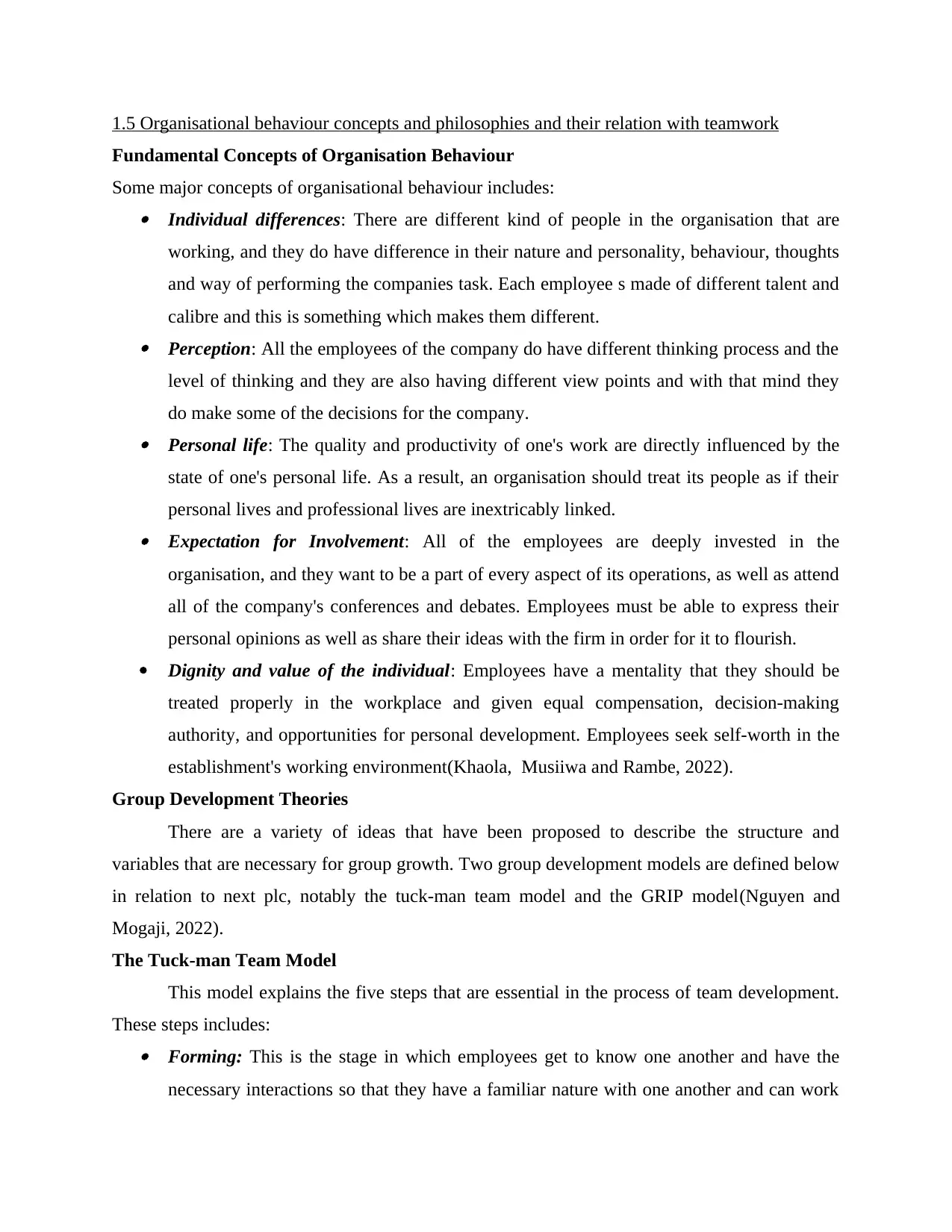
1.5 Organisational behaviour concepts and philosophies and their relation with teamwork
Fundamental Concepts of Organisation Behaviour
Some major concepts of organisational behaviour includes: Individual differences: There are different kind of people in the organisation that are
working, and they do have difference in their nature and personality, behaviour, thoughts
and way of performing the companies task. Each employee s made of different talent and
calibre and this is something which makes them different. Perception: All the employees of the company do have different thinking process and the
level of thinking and they are also having different view points and with that mind they
do make some of the decisions for the company. Personal life: The quality and productivity of one's work are directly influenced by the
state of one's personal life. As a result, an organisation should treat its people as if their
personal lives and professional lives are inextricably linked. Expectation for Involvement: All of the employees are deeply invested in the
organisation, and they want to be a part of every aspect of its operations, as well as attend
all of the company's conferences and debates. Employees must be able to express their
personal opinions as well as share their ideas with the firm in order for it to flourish.
Dignity and value of the individual: Employees have a mentality that they should be
treated properly in the workplace and given equal compensation, decision-making
authority, and opportunities for personal development. Employees seek self-worth in the
establishment's working environment(Khaola, Musiiwa and Rambe, 2022).
Group Development Theories
There are a variety of ideas that have been proposed to describe the structure and
variables that are necessary for group growth. Two group development models are defined below
in relation to next plc, notably the tuck-man team model and the GRIP model(Nguyen and
Mogaji, 2022).
The Tuck-man Team Model
This model explains the five steps that are essential in the process of team development.
These steps includes: Forming: This is the stage in which employees get to know one another and have the
necessary interactions so that they have a familiar nature with one another and can work
Fundamental Concepts of Organisation Behaviour
Some major concepts of organisational behaviour includes: Individual differences: There are different kind of people in the organisation that are
working, and they do have difference in their nature and personality, behaviour, thoughts
and way of performing the companies task. Each employee s made of different talent and
calibre and this is something which makes them different. Perception: All the employees of the company do have different thinking process and the
level of thinking and they are also having different view points and with that mind they
do make some of the decisions for the company. Personal life: The quality and productivity of one's work are directly influenced by the
state of one's personal life. As a result, an organisation should treat its people as if their
personal lives and professional lives are inextricably linked. Expectation for Involvement: All of the employees are deeply invested in the
organisation, and they want to be a part of every aspect of its operations, as well as attend
all of the company's conferences and debates. Employees must be able to express their
personal opinions as well as share their ideas with the firm in order for it to flourish.
Dignity and value of the individual: Employees have a mentality that they should be
treated properly in the workplace and given equal compensation, decision-making
authority, and opportunities for personal development. Employees seek self-worth in the
establishment's working environment(Khaola, Musiiwa and Rambe, 2022).
Group Development Theories
There are a variety of ideas that have been proposed to describe the structure and
variables that are necessary for group growth. Two group development models are defined below
in relation to next plc, notably the tuck-man team model and the GRIP model(Nguyen and
Mogaji, 2022).
The Tuck-man Team Model
This model explains the five steps that are essential in the process of team development.
These steps includes: Forming: This is the stage in which employees get to know one another and have the
necessary interactions so that they have a familiar nature with one another and can work
Paraphrase This Document
Need a fresh take? Get an instant paraphrase of this document with our AI Paraphraser
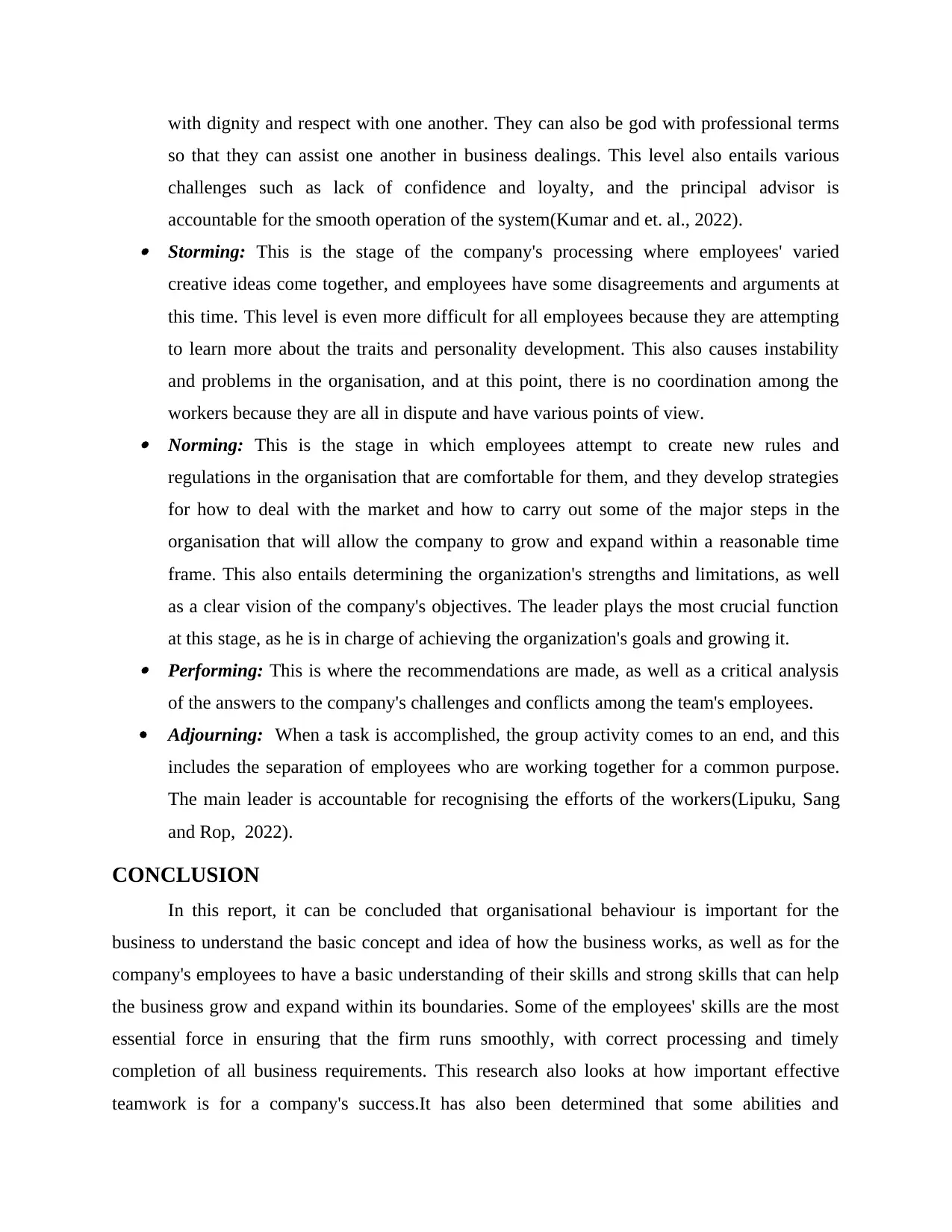
with dignity and respect with one another. They can also be god with professional terms
so that they can assist one another in business dealings. This level also entails various
challenges such as lack of confidence and loyalty, and the principal advisor is
accountable for the smooth operation of the system(Kumar and et. al., 2022). Storming: This is the stage of the company's processing where employees' varied
creative ideas come together, and employees have some disagreements and arguments at
this time. This level is even more difficult for all employees because they are attempting
to learn more about the traits and personality development. This also causes instability
and problems in the organisation, and at this point, there is no coordination among the
workers because they are all in dispute and have various points of view. Norming: This is the stage in which employees attempt to create new rules and
regulations in the organisation that are comfortable for them, and they develop strategies
for how to deal with the market and how to carry out some of the major steps in the
organisation that will allow the company to grow and expand within a reasonable time
frame. This also entails determining the organization's strengths and limitations, as well
as a clear vision of the company's objectives. The leader plays the most crucial function
at this stage, as he is in charge of achieving the organization's goals and growing it. Performing: This is where the recommendations are made, as well as a critical analysis
of the answers to the company's challenges and conflicts among the team's employees.
Adjourning: When a task is accomplished, the group activity comes to an end, and this
includes the separation of employees who are working together for a common purpose.
The main leader is accountable for recognising the efforts of the workers(Lipuku, Sang
and Rop, 2022).
CONCLUSION
In this report, it can be concluded that organisational behaviour is important for the
business to understand the basic concept and idea of how the business works, as well as for the
company's employees to have a basic understanding of their skills and strong skills that can help
the business grow and expand within its boundaries. Some of the employees' skills are the most
essential force in ensuring that the firm runs smoothly, with correct processing and timely
completion of all business requirements. This research also looks at how important effective
teamwork is for a company's success.It has also been determined that some abilities and
so that they can assist one another in business dealings. This level also entails various
challenges such as lack of confidence and loyalty, and the principal advisor is
accountable for the smooth operation of the system(Kumar and et. al., 2022). Storming: This is the stage of the company's processing where employees' varied
creative ideas come together, and employees have some disagreements and arguments at
this time. This level is even more difficult for all employees because they are attempting
to learn more about the traits and personality development. This also causes instability
and problems in the organisation, and at this point, there is no coordination among the
workers because they are all in dispute and have various points of view. Norming: This is the stage in which employees attempt to create new rules and
regulations in the organisation that are comfortable for them, and they develop strategies
for how to deal with the market and how to carry out some of the major steps in the
organisation that will allow the company to grow and expand within a reasonable time
frame. This also entails determining the organization's strengths and limitations, as well
as a clear vision of the company's objectives. The leader plays the most crucial function
at this stage, as he is in charge of achieving the organization's goals and growing it. Performing: This is where the recommendations are made, as well as a critical analysis
of the answers to the company's challenges and conflicts among the team's employees.
Adjourning: When a task is accomplished, the group activity comes to an end, and this
includes the separation of employees who are working together for a common purpose.
The main leader is accountable for recognising the efforts of the workers(Lipuku, Sang
and Rop, 2022).
CONCLUSION
In this report, it can be concluded that organisational behaviour is important for the
business to understand the basic concept and idea of how the business works, as well as for the
company's employees to have a basic understanding of their skills and strong skills that can help
the business grow and expand within its boundaries. Some of the employees' skills are the most
essential force in ensuring that the firm runs smoothly, with correct processing and timely
completion of all business requirements. This research also looks at how important effective
teamwork is for a company's success.It has also been determined that some abilities and
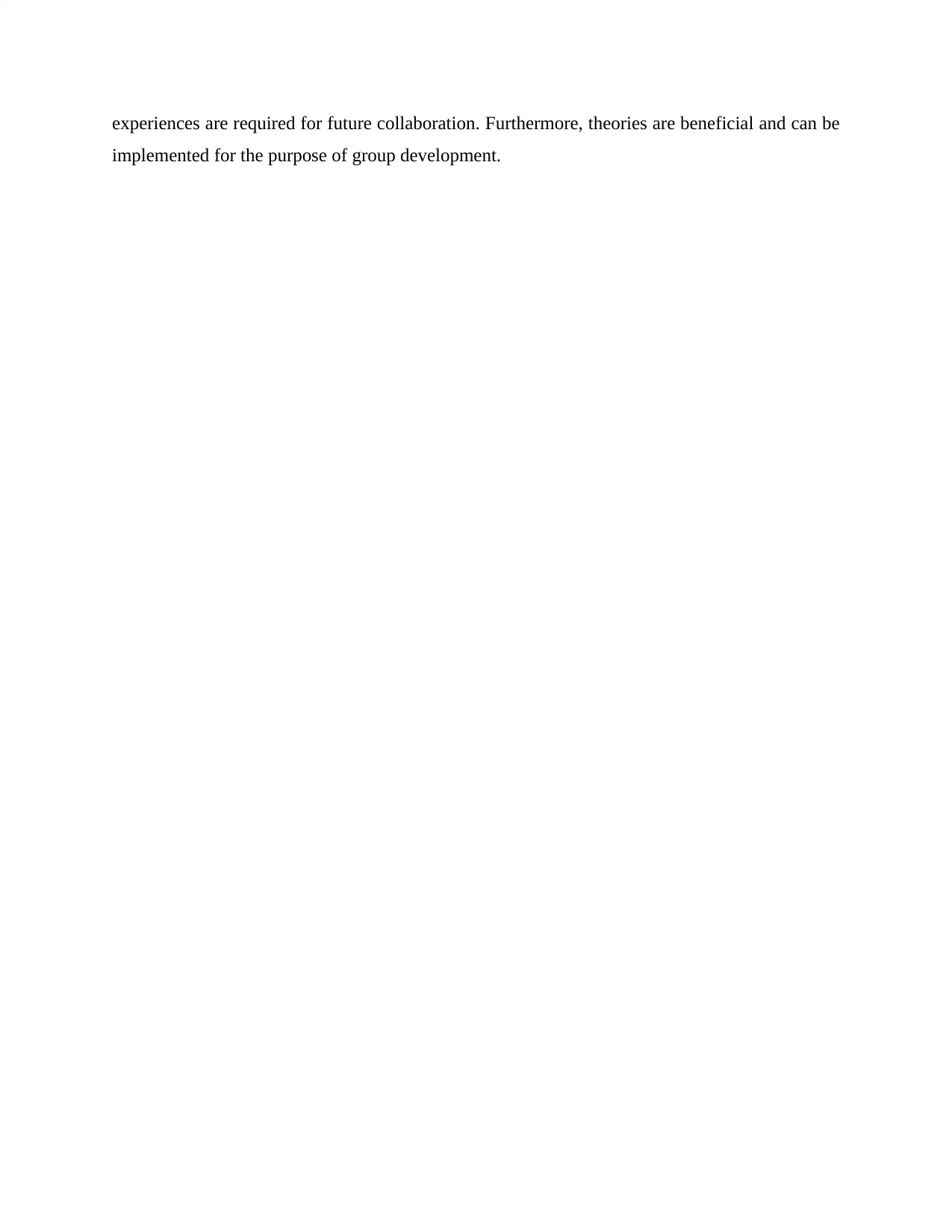
experiences are required for future collaboration. Furthermore, theories are beneficial and can be
implemented for the purpose of group development.
implemented for the purpose of group development.
⊘ This is a preview!⊘
Do you want full access?
Subscribe today to unlock all pages.

Trusted by 1+ million students worldwide
1 out of 14
Related Documents
Your All-in-One AI-Powered Toolkit for Academic Success.
+13062052269
info@desklib.com
Available 24*7 on WhatsApp / Email
![[object Object]](/_next/static/media/star-bottom.7253800d.svg)
Unlock your academic potential
Copyright © 2020–2026 A2Z Services. All Rights Reserved. Developed and managed by ZUCOL.




